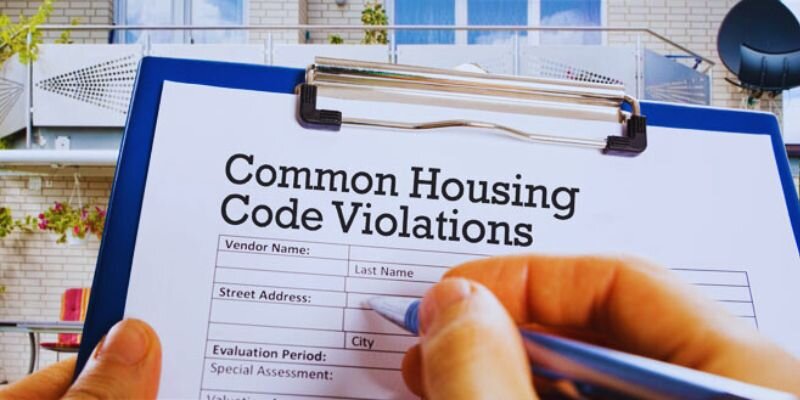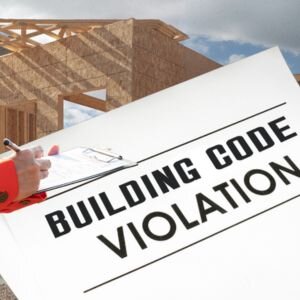
Understanding Code Violations and Their Impact on Home Sales
It might seem impossible to sell a house that has code issues, but it happens more often than you might think. A lot of homeowners have problems, like electricity systems that don’t work anymore, missing permits, or structural issues with older homes. These violations can make it harder for you to sell, especially if the buyers are getting loans that require the house to meet certain safety or habitability standards. Some issues may need to be fixed before the closing, while others can be passed on to the buyer as long as they are told about them.
The first step to a good transaction is to understand how these issues affect the sales process. If you don’t know where your house stands, calling your local building department can help you figure out what needs to be done. You don’t have to fix everything before you sell, but being honest about known violations is the best way to stay out of trouble with the law afterward.
If you’re wondering how to sell a house with code violations in Springfield, call (413) 224-8294 to speak with the team at Nunley Home Buyers today. They can walk you through your options and help make the process smoother.
Common Types of Code Violations in Homes
There are different levels of code violations. Some are small and easy to fix, while others can be so bad that they stop a home sale. Common violations include adding on without permission, having bad wiring, HVAC systems that don’t work, and damage to the structure. In older houses, the plumbing may also be old, smoke detectors may not work, or there may be mold problems. Usually, these issues happen because systems are old, people do repairs themselves, or nothing is done for a long time.
Buyers are often wary of code violations, especially those related to safety or habitability. Knowing what you’re dealing with early in the selling process gives you more control. You can either make repairs, disclose the issues, or adjust your price accordingly. In some cases, the buyer might be willing to take on the repairs in exchange for a better deal.
Understanding what kinds of violations exist in your home is the foundation of a solid selling strategy. Consider getting a pre-listing inspection to uncover hidden issues—it can save time and prevent surprises later.
Why Buyers Hesitate to Purchase Homes with Code Violations
People are usually very careful when buying homes that break the rules, and for good reason. Often, violations are a sign of deeper issues that need expensive fixes or a chance that the close will be delayed. If a home isn’t up to code, lenders might not lend money to it, and insurance companies might not cover it or charge higher fees. These problems can make it much harder for people to buy from you.
If a buyer really wants to buy your house, they might use violations as a bargaining chip to get you to lower your price or make fixes before the closing. Some people might not even bother, especially if they’re first-time sellers or using FHA loans. People can get worried when they don’t know what to do about code violations, so being open and honest is important.
By being upfront and honest about your home’s condition, you help manage expectations. Disclosing issues early builds trust and attracts the right kind of buyer—someone who’s either ready to invest in repairs or looking for a fixer-upper deal.
Legal Obligations When Selling a House with Violations
When you’re selling a house that breaks the rules, it’s not just about being honest; you have to follow the law and give the right information. In Massachusetts, sellers must tell buyers about any known major problems with the house that might make them not want to buy it. If you don’t, you could be sued or even have the sale canceled.
You don’t need to repair every violation, but you do need to be honest about what exists. This includes unpermitted renovations, major systems not up to code, or safety hazards like faulty wiring or damaged foundations. A real estate attorney can help you prepare a proper disclosure form and ensure you’re covered legally.
Some sellers add inspection records or notices of violations to their listing package as well. This keeps you out of trouble with the law and gives possible buyers more faith in you. Say something when you’re not sure, it’s safer and could save you in the long run.
Selling As-Is: What It Really Means for Sellers
Selling a home “as-is” means you’re offering the property in its current condition—no repairs, no fixes, and no guarantees. This can be an attractive option for homeowners dealing with code violations, since it shifts repair responsibilities to the buyer. However, selling as-is doesn’t free you from disclosing known issues.
You might save time and money by going this way, but it’s important to be honest with yourself. Most people who buy homes “as is” are either investors or experienced buyers looking for a deal. This means that your home will probably sell for less than a fully compliant home. Still, this trade-off might be worth it to avoid checks or repairs that cost a lot of money.
Make sure it’s clear in the ad that the house is being sold “as is,” and include any proof that backs that up. Being clear helps avoid confusion and weeds out buyers who don’t want to deal with fixes.
Pricing Strategies for Homes with Code Issues

Pricing a home with code violations requires a careful balance between market expectations and property condition. Start by comparing your home to similar properties in the area—then subtract the estimated cost of bringing your home up to code. That will give you a realistic idea of what buyers might be willing to pay.
It’s not just about the cost of repairs, though. Buyers will also factor in the inconvenience and risk involved. This means you may need to price slightly below market value to attract attention. If you price too high, buyers will simply move on to homes that don’t require extra work.
Working with a knowledgeable real estate professional or appraiser can help you land on a competitive price point. And remember, a fair price can help offset the negative impact of violations and keep the deal moving.
Can You Sell a House with Open Permits?
You can sell a house with open permits, but it might be harder to do so. When work on your property began but wasn’t finished or properly closed out with the local building department, the permit will still be open. This could make buyers nervous, which could slow down the close process until things are fixed.
In some cases, the buyer may agree to take responsibility for closing the permits after the sale. Other times, the seller must resolve them beforehand to keep the deal alive. You’ll need to disclose any open permits during the sale, and it’s wise to be proactive in resolving them where possible.
If you’re not sure if your property has any open permits, you can check with your local building department. Getting these things out of the way early on can make negotiations go more smoothly and give buyers more trust.
How to Disclose Code Violations Properly
Not only is it the law, but it’s also a good idea to disclose things correctly. Telling potential buyers about known code violations builds trust, keeps you out of trouble with the law, and makes talks go more smoothly. You don’t have to look for problems, but you do have to tell people about them if you know about them.
Start by listing all known violations on your property condition disclosure form. If you have them, include inspection records, notices of violations, or repair estimates that are relevant. The fact that you’re clear also shows that you have nothing to hide, which can make your home look better.
If you’re unsure how to handle this process, consult with a real estate attorney or agent familiar with Massachusetts property law. They can guide you on what must be disclosed and help ensure your paperwork is accurate.
Should You Fix Code Violations Before Listing?
Whether or not you should fix code violations before listing depends on your budget, timeline, and market conditions. Making repairs can increase your home’s value and attract more buyers, especially if the violations are major or safety-related. On the other hand, fixing every issue may not be financially realistic.
First, figure out which problems are the most important, like structure issues or potential safety risks. These are the kinds of violations that often keep buyers away or stop them from getting credit. There is a chance that fixing a few big problems will make your listing more appealing and raise the price you get in the end.
If repairs aren’t feasible, selling as-is with proper disclosures is still a viable option. Just make sure you’re upfront about what needs to be done. Transparency helps filter out buyers who aren’t prepared for the workload—and saves you time during negotiations.
Selling to Investors vs. Traditional Buyers
People who are looking to buy a house that has code issues could be both regular people and real estate investors. With each type, you can expect different things. Most of the time, traditional buyers want homes that are ready to move into, and code violations can turn them away, especially if they’re using financing that needs compliance with the codes.
On the other hand, investors are usually more flexible and willing to take on repairs. They think fixer-uppers are a good way to make money, and many of them will pay cash, which makes the closing process faster and easier. It’s likely that an investor will give you less money, but you won’t have to deal with inspection delays, lender requirements, or expensive repairs.
As trusted cash home buyers in Hampden, we make fair cash offers, take care of the paperwork, and close on your timeline. If speed and convenience matter most to you, this might be the right route.
Understanding Code Violations and Their Impact on Home Sales

It may seem impossible to sell a house that has code issues, but it happens more often than you might think. Many homeowners have problems with things like old electrical systems, missing licenses, or structural issues, especially with older homes. If you break these rules, it might be harder to sell your home, especially if the buyers are getting loans that require the house to meet certain safety or habitability standards. If the violations are serious enough, some may need to be fixed before the closing, while others can be passed on to the buyer as long as they are told about them.
The first step to a good transaction is to understand how these issues affect the sales process. If you don’t know where your house stands, calling your local building department can help you figure out what needs to be done. You don’t have to fix everything before you sell, but being honest about known violations is the best way to stay out of trouble with the law afterward.
If you’re wondering how to sell a house with code violations in Springfield, call (413) 224-8294 to speak with the team at Nunley Home Buyers today.
Common Types of Code Violations in Springfield, MA
In Springfield, breaking the law can be anything from a small offense to a major safety risk. Some of the most common problems are bad wiring, illegal additions, water issues, and not taking care of the property properly. Small problems can add up over time, especially if regular checks or changes haven’t been done. Local officials may also issue fines for lawns that are too overgrown, too much trash, or buildings that aren’t safe.
Each city has its own building codes and enforcement process, and Springfield is no different. The city’s inspectional services keep close watch on housing conditions to ensure residents are living in safe, habitable environments. If a property has received one or more citations, they’re typically documented with the city, and you can request a list of violations through the local code enforcement office.
Understanding the nature and severity of your home’s violations is crucial in determining how best to move forward with the sale. Some violations are easy fixes, while others may require professional help or negotiation during closing. Either way, being informed helps you stay in control.
Disclosing Code Violations to Potential Buyers
When selling a house that breaks the rules, being honest is the best thing you can do. In Massachusetts, homeowners are expected by law to tell potential buyers about any known problems with their home that might affect its safety or functionality. Buyers need to know about any problems that haven’t been fixed, even if you plan to sell the house “as is.” This includes problems with the structure, electrical dangers, plumbing, or any fines that are still due from the city.
Transparency builds trust with potential buyers and can help avoid delays or legal troubles later in the process. Buyers who feel blindsided by undisclosed issues might back out of the deal or request costly repairs before closing. Full disclosure, on the other hand, allows you to set realistic expectations from the start.
If you’re unsure how to present this information, consider working with a real estate attorney or property specialist. They can help you prepare accurate and clear documentation that protects your interests while satisfying legal requirements.
Selling “As-Is” With Code Violations
If you don’t want to—or can’t—make repairs, listing your home “as-is” is a practical option. This means you’re selling the property in its current condition and won’t be making any repairs before closing. In Springfield, many buyers, especially real estate investors, look for as-is properties with the intent to renovate them. It can be a smart move if you’re short on time or cash.
You can’t skip full information, though, just because the house is being sold “as-is.” You are still responsible for telling buyers about safety problems or code violations that you know about. It might sell faster if you sell it “as is,” but the price you ask may go down if there are major violations that need expensive repairs.
The key to success in an as-is sale is pricing the property appropriately and targeting the right buyers. Cash buyers or investor groups are often more flexible with repairs and timelines than traditional homebuyers using financing.
The Role of Home Inspections in Identifying Violations
Even if you know about some issues with your home, a professional home inspection can give you a clearer picture of all code violations before selling. In fact, getting your own inspection before listing the property can help you avoid surprises during the buyer’s due diligence phase. Inspectors can identify issues with the roof, plumbing, electrical systems, and even structural integrity.
This kind of upfront knowledge allows you to decide whether it’s worth fixing certain problems or adjusting your sale strategy. You’ll also be better prepared to answer questions from buyers and negotiate based on facts rather than speculation. A detailed inspection report gives your listing more credibility, especially if you’re planning an as-is sale.
If you’re working with a real estate professional or planning to handle the sale yourself, a home inspection is a smart early step. It’s one of the best ways to gain control over the situation and plan your next moves.
Weighing the Costs of Repairs vs. Selling As-Is

One of the first decisions homeowners face is whether to fix the violations or sell the home as-is. Repairs can be costly, especially if the issues involve major systems like plumbing, roofing, or electrical. On the other hand, selling as-is may result in a lower sale price, depending on market conditions and buyer demand in your area.
The key is evaluating which option gives you the better return. Start by getting estimates for the most serious violations—things that affect safety or livability. Sometimes, addressing just a few critical items can raise your home’s value enough to justify the cost. Other times, it’s better to price the home attractively and let the next owner take care of the rest.
Every situation is different, so take a close look at your budget, timeline, and goals. If time is tight or you want a stress-free process, an as-is sale may be the better route.
How Code Violations Affect the Appraisal Process
When a buyer applies for a mortgage, the lender will require a home appraisal to determine the property’s value. Code violations can lower the appraised value significantly, especially if they impact the home’s structure, safety, or livability. If the appraisal comes in lower than the purchase price, financing could fall through unless the buyer makes up the difference or the seller lowers the price.
Appraisers are trained to look for obvious red flags, such as unfinished construction, damaged roofs, or outdated wiring. They may also note any issues reported in public records, which could include city-issued citations or known violations.
For this reason, many sellers with code violations turn to cash buyers or investors who don’t rely on appraisals for financing. This can help you avoid appraisal-related delays and complications.
Financing Challenges for Buyers of Homes with Violations
Traditional mortgage lenders are often reluctant to finance homes with unresolved code violations. That’s because the property may not meet minimum safety and habitability standards, making it a risky investment for the bank. If violations involve electrical, structural, or plumbing systems, they’re more likely to pose financing challenges.
Buyers using FHA, VA, or conventional loans may run into issues during the underwriting process. Some lenders require repairs before approving the loan, which puts pressure on you as the seller. This can delay the sale or force price negotiations you weren’t planning for.
To avoid these obstacles, many sellers with non-compliant properties turn to cash buyers or investors who can close without relying on financing. These buyers often expect some level of repairs, making them more flexible in these situations.
Attracting the Right Buyers for Homes With Code Issues
Selling a house with code violations means targeting the right kind of buyers. Traditional homeowners may be discouraged by the idea of making repairs or dealing with permits. However, real estate investors, flippers, and cash buyers are typically more open to properties in less-than-perfect condition.
These buyers see potential where others see problems. They often have teams in place to handle renovations, and they understand the risks involved. Marketing your home to this audience requires honesty, but also strategic positioning—highlighting the potential for equity growth or rental income once the issues are fixed.
Consider listing your home on platforms that cater to investors or contacting local real estate wholesalers. A buyer who’s used to handling distressed properties will likely move faster and make fewer demands.
As trusted cash home buyers in Springfield, we make fair cash offers, take care of the paperwork, and close on your timeline.
How to Get a List of Properties with Code Violations?
While this might seem like a question for investors, it’s actually useful for homeowners too. If you’re selling a house in Springfield and want to understand the local market, seeing which properties also have violations can offer valuable insight. It helps you compare your situation to other sellers and see how your property stacks up in terms of pricing and condition. You can usually obtain this information from the Springfield Code Enforcement Office or through public records requests.
However, it’s important to note that while this information is public, the process of obtaining it can vary by city and department. You might need to submit a formal records request or contact someone directly to access up-to-date reports. Knowing how many other properties are in a similar condition can give you confidence when setting your price or negotiating with buyers.
As trusted cash home buyers in Springfield, we make fair cash offers, take care of the paperwork, and close on your timeline. That’s one less thing to worry about when your home has unresolved violations.
How Do I Report a Code Violation on a Property?
This section typically serves tenants or neighbors, but for homeowners, it’s still relevant if you’re dealing with joint property issues or inherited homes. If a co-owner refuses to fix violations or a property next door is causing problems, you may need to report it to the Springfield Code Enforcement Department. This can trigger an inspection and formal citation process, which often results in the responsible party being required to take action.
The reporting process is usually anonymous and can often be done online or by phone. Include as many details as possible—location, nature of the issue, and photos if available. But keep in mind, reporting your own home’s violations won’t help your selling process. Instead, it’s more productive to work with professionals who can help you sell despite the violations.
If you’re searching for a reliable company that buys homes in Hatfield, give us a call at (413) 224-8294 for a no-obligation offer.
How Long Does It Take to Sell a House with Code Violations?
The timeline can vary depending on the type and extent of the violations, but in general, selling a house with unresolved issues takes longer than a move-in-ready home. Traditional buyers—especially those using mortgages—might back out if the home doesn’t pass inspections. In some cases, lenders won’t approve financing until major violations are corrected.
If you choose to fix the violations, that could take weeks or even months, depending on contractor availability and permit timelines. On the other hand, if you sell the home “as-is” to a cash buyer, the process could take as little as 7 to 14 days. It all comes down to the strategy you choose and your goals as a seller.
Being realistic about timelines helps set expectations and avoid frustration. If you’re in a hurry or don’t want to deal with repairs, working with a company that specializes in distressed properties can cut the timeline significantly.
Need to sell your home quickly and hassle-free? Whether you’re trying to avoid costly repairs, skip realtor commissions, or just want a straightforward sale, Nunley Home Buyers can help. We make the process easy—reach out today to get started!
Helpful Springfield Blog Articles
Avoid Mortgage Paying Trouble for Springfield Homeowners
Minimize Or Eliminate Closing Costs For Homebuyers In Springfield, MA
Selling An Inherited House In Springfield, Massachusetts
Understanding Appraisal Required Repairs For Homes In Springfield, MA
Effective Strategies For Selling A House With Code Violations In Springfield, MA
Essential Paperwork Guide For Selling Your Springfield, Ma Home By Owner

| STATE OF MASSACHUSETTS | REVIVAL HOMEBUYERS | REALTORS | HOMEBUYERS | AUCTION | AUCTIONING |
| AUCTIONEERS | WATER | VENTILATION | VENTILATION SYSTEMS | SMOKE ALARMS | SMOKE DETECTORS |
| SMOKE | PROPERTY APPRAISAL | APPRAISAL | HEALTH AND SAFETY | HOME INSPECTORS | MORTGAGE LOANS |
| LOANS | LENDING | HEATING AND AIR CONDITIONING | HEATER | HEALTH | |
| ELECTRICAL WIRING | WATER HEATER | GFCI | GROUND-FAULT CIRCUIT INTERRUPTER | PLUMBING SYSTEM | PIPING |
| NATIONAL ELECTRICAL CODE | NATIONAL ELECTRICAL CODE (NEC) | MOLD | HOMEOWNERS ASSOCIATIONS | HOA | HOMEOWNERS ASSOCIATIONS (HOAS) |
| HANDRAILS | FIRE HAZARDS | FIRE SAFETY | CONSTRUCTION | ASBESTOS | SHOWER |
| SHOWER DOOR | PRESSURE | NONPROFIT ORGANIZATION | NONPROFITS | MONEY | MOISTURE |
| JURISDICTION | INTERNATIONAL RESIDENTIAL CODE | INTERNATIONAL CODE COUNCIL (ICC) | HAZARDS | HEALTH HAZARDS |
